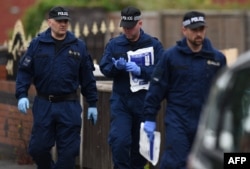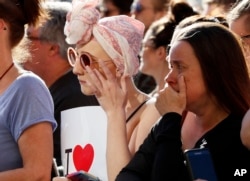British police said Wednesday it was “clear” the suicide bomber who attacked a concert in Manchester did not act alone.
"It's very clear that this is a network that we are investigating," Manchester Chief Constable Ian Hopkins said during a news conference.
Hopkins said police had four people in custody, so far, as police conduct armed raids throughout Manchester, though he would not confirm whether police found the alleged bomb maker.
A statement Wednesday from Greater Manchester Police said only that the arrests came after officers executed warrants in South Manchester. There was no information about how the four men might be involved in the attack.
British interior minister Amber Rudd said Wednesday the suicide bomber, who has been identified as Salman Abedi, 22, was "known" by British intelligence services before the bombing.
She also told the BBC that "it seems likely, possible, that he wasn't doing this on his own."
The blast at the conclusion of a concert by American pop star Ariana Grande at Manchester Arena killed 22 people and wounded 59 others. The attacker also died at the site.
Investigation shifts to Abedi's activities
Investigators are now trying to figure out what Abedi was up to in his last days before the attack Monday.
French Interior Minister Gerard Collomb told BFM television on Wednesday that British and French intelligence have information that Abedi had likely traveled to Syria.
According to Collomb, Abedi “grew up in Britain and then suddenly, after a trip to Libya and then likely to Syria, became radicalized and decided to carry out this attack.”
"In any case, the links with Daesh (Islamic State) are proven," he said.
Islamic State is claiming it was behind the attack, but neither British nor U.S. intelligence have confirmed that.
Terror level raised
Britain raised its terrorism alert level to critical – the highest step – after the blast, signaling that another attack was highly likely and could be imminent.
The change is most visible in the deployment of soldiers to help guard certain areas, including major events such as concerts and football matches, in order to free up police officers.
Hopkins said an off-duty police officer was among those killed in the suicide attack, but it will take up to five days for authorities to identify all the victims.
“Due to number of victims the Home Office post-mortems are likely to take four to five days. After this we will be in a position to formerly name the victims,” he said. “We have spoken to all of the families of those who lay injured in our hospitals.”
British Prime Minister Theresa May said in an address to the nation late Tuesday that authorities will do everything possible to protect the public and asked people to remain vigilant.
"I do not want the public to feel unduly alarmed. We have faced a serious terrorist threat in our country for many years," May said.
Maximum carnage
Earlier in the day, she spoke more directly about the attack itself, saying the bomber chose the "time and place to cause maximum carnage and to kill and injure indiscriminately."
Many of the victims were young girls, with the youngest identified so far being just 8-year-old.
Video from the arena showed the joy in the audience at the end of the concert turning to confusion and then to panic and a scramble to get out of the building as the realization of what just happened spread.
Witness say they saw blood covered bodies on the floor while others, badly wounded, staggered toward the exits of the building.
The scene outside the concert hall was also chaotic, with traffic snarled and parents rushing to the scene.
Britain's Queen Elizabeth held a moment of silence at a garden party at Buckingham Palace. French President Emmanuel Macron signed a condolence book at the British embassy in Paris. German Chancellor Angela Merkel said the attack only strengthens Germany's resolve to work with the British.








